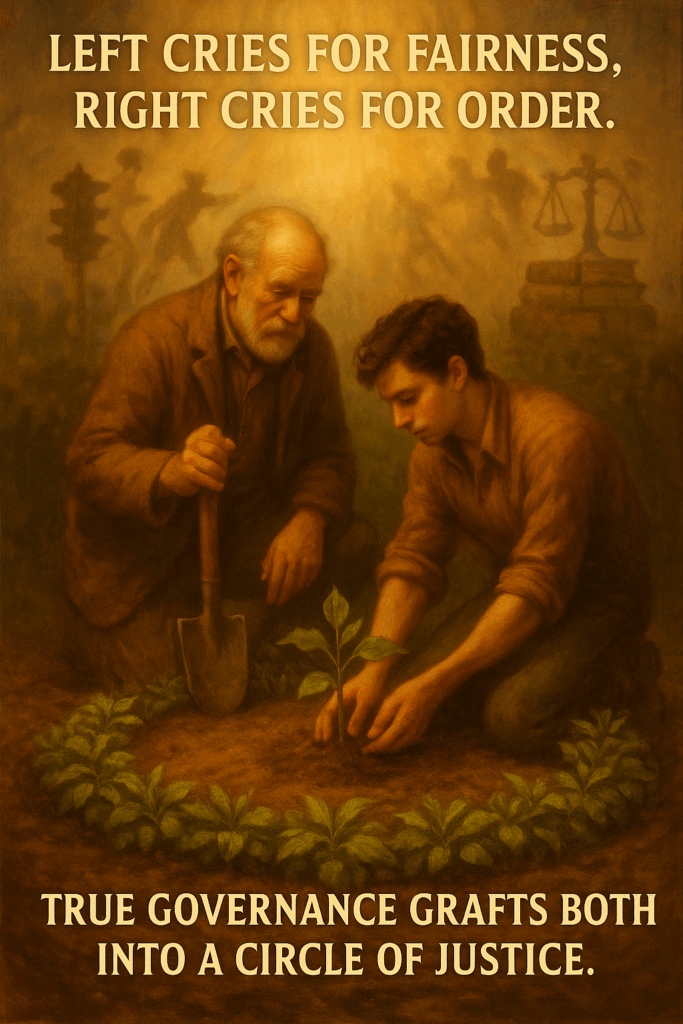
The morning light filtered through the kitchen window, casting soft patterns across the table where Emil sat, the ledger closed beside him. The scent of fresh bread wafted from the oven, warm and steady, yet his thoughts churned, stirred by the Seed Carriers’ visit to Crestview and Grandfather’s words from the night before: “Diversity is God’s palette… mismanagement is the enemy.” The basil leaf, pressed within the ledger’s pages, rested like a quiet vow, its faint aroma grounding him.
“Grandfather,” Emil began, his brow furrowed, “at Crestview, Aisha planted a seedling, and both the Red Jackets and Eastsiders wrote in a ledger. But they’re so divided—one cries for fairness, the other for order. Isn’t government supposed to stop differences from becoming battles?”
Grandfather Tomas set down his mug, his eyes deep with the weight of history. “Before government, Emil, there is thought. Conflict begins not in laws, but in how we wield our minds.”
He leaned forward, his voice steady as soil. “Every soul is born with the gift of thought, but right thinking is a discipline. It means rising above likes and dislikes, seeing truth as it is, not as you wish it. It demands freedom from bias, a willingness to face hard facts, even when they challenge you. Judge actions, not hearts; base choices on reason, not suspicion. That is the beginning of clarity.”
Emil nodded, the ledger’s stories of fire and growth flashing in his mind.
Tomas’s tone grew firm. “But too many think in black and white—‘us’ versus ‘them,’ left versus right, with no gray between. Political parties feed this dualism. The left, like your Red Jackets, cry for fairness and change, but may exclude those who question their zeal. The right, like your Eastsiders, defend order and tradition, but shut out those who press for progress. When parties or cliques harden into rigid camps, they turn differences into divisions. That is how mismanagement begins.”
Emil’s fingers brushed the ledger, his voice sharpening. “But what if governments let it happen on purpose? Like parties stirring up fights just to win power? At Crestview, the Red Jackets call the Eastsiders ‘privileged,’ and the Eastsiders call them ‘troublemakers.’ It feels like they profit from the split. How do you tend fairness when leaders—here or in the world—thrive on chaos?”
Tomas’s eyes twinkled with pride at the question’s depth. “You’ve seen the root, Emil. Parties, like cliques, often harvest power from discord, just as nations fuel wars to hold sway. But a true gardener of fairness—whether a student or a government—plants dialogue, not division. Government exists to draw a circle of fairness around all, protecting what is sacred: life, dignity, freedom, and property. Taxes, laws, and courts are not ends in themselves; they are tools to guard every person’s choices, not just the strong. Think of traffic laws, Emil. Without them, the reckless would rule the road. With them, everyone moves safely. That is the government’s task.”
Emil frowned, glancing at the greenhouse through the window, its scarred glass catching the sun. “So government’s like a keeper, tending differences so they don’t spiral into fights. But what if it fails—like Mr. Vance at Crestview, dismissing Aisha’s ledger as childish?”
“Exactly,” Tomas said, his voice warm but resolute. “Government is a caretaker, not a master. It exists because freedom, God’s gift, makes conflict inevitable—our test as humans. Without order, the strong crush the weak. But the deeper truth, Emil, is this: when humanity learns to manage differences through trust, through ledgers like yours, the need for government will fade. Then rulers, armies, even the UN will no longer be necessary. Until that day, governments must be gardeners—tending freedom without strangling it, creating spaces where every voice—left, right, Red Jacket, Eastsider—can be heard.”
Emil’s thoughts turned to Aisha’s seedling, her hesitant scrawl: “I want to stop fighting, but I don’t know how.” He leaned forward, a spark in his eyes. “Aisha’s ledger started something at Crestview, but it’s fragile. If governments need ledgers too, could we bring the Accord to the city? Show leaders how to tend differences, like we’re trying with the UN?”
Tomas smiled, his weathered hand resting on Emil’s shoulder. “Start small, Emil. Cities, like schools, resist new seeds. Your summit will be a chance to plant—show them a ledger can outshine a law. But beware: new soils bring storms. Some will scorn, some will uproot. Tend with patience, and the harvest will grow.”
Emil nodded, the greenhouse’s vines visible through the window, their leaves a quiet promise. Aisha’s mural, the UNSC letter, the summit ahead—they were all seeds, fragile yet defiant. Governments might falter, but the Accord could teach them to tend. He opened the ledger, imagining a new page, one that held not just a school’s story, but a city’s, a world’s.

